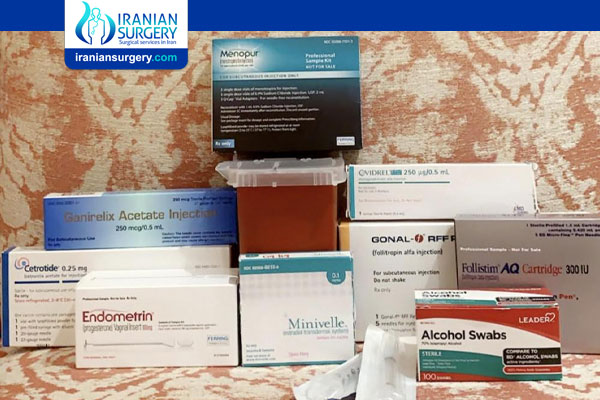IVF Medications Schedule
IVF Medications Schedule
IVF, or in vitro fertilization, is one form of treatment that may help those experiencing infertility to conceive. In fact, at least 8 million babies born today are a result of this procedure. That’s remarkable when you consider the first successful IVF procedure was only conducted in 1978.
In this article we’ll share what a typical IVF schedule might look like, beginning with medications used to grow follicles, the egg retrieval process, and finally, transfer options.
What Medications Should I Expect with IVF?
The IVF process itself requires considerable IVF medication use on a precisely timed schedule. For these reasons, it’s important to understand what you might be prescribed as well as any potential IVF medication side effects.
Days 1 to 4
On the first day of a patient’s menstrual cycle they will typically call to schedule a “baseline” visit for Day 3 of their cycle. This appointment includes an ultrasound and bloodwork. After this visit, if approved, patients will start hormone injections (commonly referred to as “stimulation meds” or “stims”).
These injections stimulate egg production so a woman’s body produces many follicles in a cycle, not just one (follicles house eggs that contain all the hormones and fluids needed to make an egg mature). Patients with one or more follicles already grown may need to wait until their next period cycle or use a different protocol.
Stims are typically injected between 6-9PM daily at a consistent time.
Common stims medications include:
. Gonal-f or Follistim
. Menopur or Low-Dose hCG
Supportive/adjunctive medications include:
. Omnitrope - A growth hormone whose main purpose is to help improve the quality of eggs. Not every patient will see this on their protocol. Typical use cases include poor responders to stimulation medications and women who have a decreased ovarian reserve.
As a result of injections it is normal for patients to experience soreness or mild bruising at the site of injection. Bloating, cramping, headaches, breast tenderness and in some cases, temporary allergic reactions are also common side effects.
Days 5-10
During this period patients will continue stims and may start what is known as “antagonists” to prevent premature ovulation (i.e. once eggs are released into the pelvic cavity they cannot be retrieved). These types of medications block the hormone (gonadotropin-releasing hormone-GnRH) that causes eggs to be released from the ovaries.
Regular monitoring visits will likely include additional ultrasounds and bloodwork and occur around days four and six and every other day after. Visit results will then determine if nightly doses need to be changed or if an antagonist is necessary. In these cases, patients will often have leftover medications or need refills.
Common medications may include:
. Ganirelix
. Cetrotide
. Leuprolide
Side effects are similar to those experienced during days one to four. Some patients also experience what is known as ovarian hyperstimulation syndrome (OHS). In this instance there is an overproduction of follicles that can cause extreme swelling or pain in the ovaries. Depending upon the severity, treatment may be cancelled until a future cycle.
Days 10+
Patients will receive a final ultrasound and bloodwork to confirm if the follicle pack has reached maturity. If so, a “trigger shot” is assigned approximately 35-36 hours before retrieval to stimulate final growth spurt and ovulation.
Trigger shots are hormones that support the normal development of an egg in a woman's ovary, essentially triggering the egg to go through a final growth spurt, and stimulate the release of the egg during ovulation from the follicles within 36 hours.
Common medications include:
. Leuprolide
. Ovidrel
. Novarel/Pregnyl
In most cases, patients will discontinue all other medications and are given a deep sedation for the 15–45-minute retrieval process. Following the procedure, it’s normal to feel mild cramping or experience some vaginal spotting.
Keep in mind that follicles may be empty at the time of retrieval or contain an immature egg. This means the number of eggs retrieved after egg retrieval may be lower than the number of follicles seen on the ultrasound or based on bloodwork.
About Iranian Surgery
Iranian surgery is an online medical tourism platform where you can find the best infertility specialists in Iran. The price of IVF treatment in Iran can vary according to each individual’s case and will be determined by an in-person assessment with the doctor.
For more information about the cost of IVF treatment in Iran and to schedule an appointment in advance, you can contact Iranian Surgery consultants via WhatsApp number 0098 901 929 0946. This service is completely free.
Source:
https://alto.com/blog/post/ivf-medications-schedule-and-side-effects-explained


